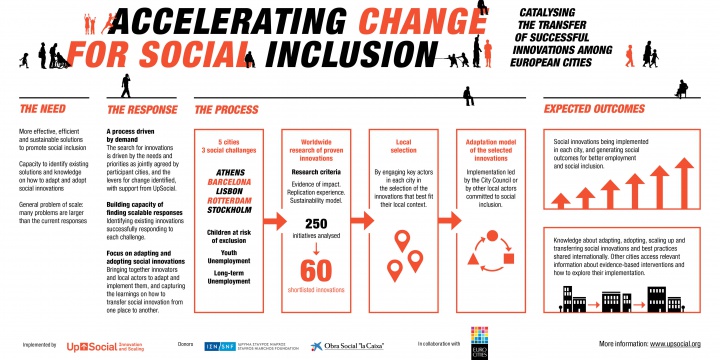
- Athens, Barcelona, Lisbon, Rotterdam and Stockholm join efforts to find innovative responses to common social challenges by promoting the scale of existing solutions.
- Through a worldwide research, the Accelerating Change for Social Inclusion project has short-listed 60 innovations from 250+ initiatives identified that face challenges about unemployment and social exclusion.
- Within the frame of the project, experts and key actors in each city selected the innovations that best fit the local context to explore their implementation.
The Accelerating Change for Social Inclusion project (ACSI) seeks to catalyse the transfer of proven innovations among European cities, capturing the learning on how to transfer social innovation from one place to another.
Within the frame of the ACSI project, five European cities work together to build the capacity of identify scalable responses to three common challenges. The idea is identify successful projects from abroad that could be implemented locally to solve social problems instead of creating new solutions from zero.
250+ initiatives facing problems about children at risk of exclusion, youth unemployment and long-term unemployment were identified worldwide. The 60 short-listed innovations (20 per challenge) were selected based on the following main criteria: evidence of impact, replication experience and sustainability model.
At the current stage, the cities of Athens, Barcelona, Lisbon, Rotterdam and Stockholm have selected the most appropriate innovations to explore their implementation. Local experts and key actors were invited to participate in the process, also to inspire them to take different approaches that are more effective, efficient and sustainable to contribute to solve social challenges.
Some examples of innovations that the ACSI Partner Cities are exploring to implement locally:
- Jongerenloket. A one-stop-shop service and a hub of resources for youth at risk of exclusion, managed by the municipality; it forms a single institution where young people can go for assistance relating to education, housing, health, entrepreneurship and other issues. Initially developed in Rotterdam, it has been implemented throughout the Netherlands. The City of Athens is exploring how to implement it locally.
- Relais Accueil Petite Enfance. Early Childcare Service Point aimed to lift barriers to employment and ensuring social inclusion through a flexible and responsive approach to childcare. The service targets families receiving income-support benefits, where the parent or parents are seeking employment and need suitable childcare in order to find or hold down a job. Initially developed in Nantes Nord by the municipality, it is currently implemented throughout Nantes. The cities of Barcelona and Lisbon are exploring how to implement it locally.
The process focuses on how to transfer social innovations from one place to another and share the learnings within European cities. Accessing knowledge about adapting and adopting social innovation can be crucial to succeed in finding scalable responses to social challenges.